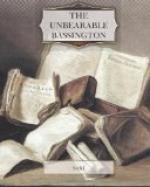Egbert was one of those men who have no small talk, but possess an inexhaustible supply of the larger variety. In whatever society he happened to be, and particularly in the immediate neighbourhood of an afternoon-tea table, with a limited audience of womenfolk, he gave the impression of someone who was addressing a public meeting, and would be happy to answer questions afterwards. A suggestion of gas-lit mission-halls, wet umbrellas, and discreet applause seemed to accompany him everywhere. He was an exponent, among other things, of what he called New Thought, which seemed to lend itself conveniently to the employment of a good deal of rather stale phraseology. Probably in the course of some thirty odd years of existence he had never been of any notable use to man, woman, child or animal, but it was his firmly-announced intention to leave the world a better, happier, purer place than he had found it; against the danger of any relapse to earlier conditions after his disappearance from the scene, he was, of course, powerless to guard. ’Tis not in mortals to insure succession, and Egbert was admittedly mortal.
Elaine found him immensely entertaining, and would certainly have exerted herself to draw him out if such a proceeding had been at all necessary. She listened to his conversation with the complacent appreciation that one bestows on a stage tragedy, from whose calamities one can escape at any moment by the simple process of leaving one’s seat. When at last he checked the flow of his opinions by a hurried reference to his watch, and declared that he must be moving on elsewhere, Elaine almost expected a vote of thanks to be accorded him, or to be asked to signify herself in favour of some resolution by holding up her hand.
When the young man had bidden the company a rapid business-like farewell, tempered in Suzette’s case by the exact degree of tender intimacy that it would have been considered improper to omit or overstep, Elaine turned to her expectant cousin with an air of cordial congratulation.
“He is exactly the husband I should have chosen for you, Suzette.”
For the second time that afternoon Suzette felt a sense of waning enthusiasm for one of her possessions.
Mrs. Brankley detected the note of ironical congratulation in her visitor’s verdict.
“I suppose she means he’s not her idea of a husband, but, he’s good enough for Suzette,” she observed to herself, with a snort that expressed itself somewhere in the nostrils of the brain. Then with a smiling air of heavy patronage she delivered herself of her one idea of a damaging counter-stroke.
“And when are we to hear of your engagement, my dear?”
“Now,” said Elaine quietly, but with electrical effect; “I came to announce it to you but I wanted to hear all about Suzette first. It will be formally announced in the papers in a day or two.”
“But who is it? Is it the young man who was with you in the Park this morning?” asked Suzette.




